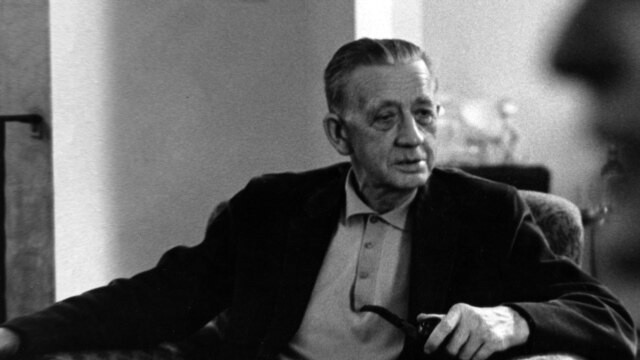Ferdinand Peroutka: Mr. Czechoslovakia

On May 1, 1951, respected Czech journalist and first RFE Czechoslovak Service Director Ferdinand Peroutka began the first official transmission from Radio Free Europe (RFE) headquarters in Munich, saying, “This is the voice of a free Czechoslovakia.” He then added, “One free radio station in a dictatorship means a revolution.”
Born in Prague in 1895, Ferdinand Peroutka was one of the founders of Pritomnost, the preeminent Czech cultural and political journal of the first democratic Czechoslovak Republic. It was financially backed by President T.G. Masaryk, who was accustomed to intellectual sparring with Peroutka, but also saw his work as a model for journalism in Czechoslovakia. In addition to publishing Peroutka’s commentaries on democracy, Pritomnost was also a platform for the work of other renowned writers of the First Republic such as Karl Capek and Milena Jesenska.
After publishing an essay in 1939 titled Dynamic Life, which urged Czechs to eschew the growing rhetoric of fascism, Peroutka was arrested and sent to Dachau concentration camp and then to Buchenwald. He refused an offer to gain his freedom in exchange for agreeing to publish a Nazi collaborationist journal. After the communist coup in Czechoslovakia in February 1948, Peroutka again came under pressure and had to flee the country on foot across the border to Bavaria.
He was recognized in the West as a highly respected public figure in his home country, and after struggling briefly to find work in the UK, he went to the United States and accepted a job with Radio Free Europe (RFE), which was established in 1950. As the founding director of the Czechoslovak Service, he was tasked with developing a programing concept and hiring the service’s first employees. He also continued to write and air his commentaries.
“He was respected not only for his skills, but also as a persecuted person,” said Czech historian Prokop Tomek. “And he touched listeners in Czechoslovakia.”
One of those listeners was future Czechoslovak Service broadcaster Olga Kopecka. She left Czechoslovakia with her mother in the 1960s, but says the broadcasts of Peroutka and his colleagues had sustained her during the isolation of her youth.
“We were cut off from the world. I wasn’t allowed to go to university because of my family’s political views and because my mother had committed the crime of wanting to marry a foreigner, so that was held against me,” said Kopecka. “But I was able to get an education through RFE, and Peroutka’s commentaries were particularly important because he not only explained the events of the day, but he also gave us a picture of the past, of what life was like in a democracy during the First Republic.”
During his tenure as Czechoslovak Service Director from 1951-1961 and after as a freelance contributor, Peroutka dedicated many of his commentaries to explaining the ideas of T.G. Masaryk, Edvard Benes, and other democratic leaders of the First Republic. He also defended victims of political persecution like Milada Horakova, who was executed by the communist regime in 1950. He was optimistic about the 1968 Prague Spring reform movement that was ultimately crushed by Soviet-led Warsaw Pact troops.
Like other prominent exiles, he was constantly subject to false claims during his lifetime. In a 1953 commentary broadcast by RFE titled Who is Ferdinand Peroutka?, he implored Czechoslovak youth to ask older people about life during the First Republic in order to refute official accusations that he was a traitor.
Referring to the suppression of documentation about the First Republic under Communism, he told listeners, “If Rude Pravo [Czechoslovak communist newspaper] claims today that at one time I wrote this or that sentence, how do you know it’s true? …All of the books about our history have been taken from you, so how then can you know if this or that really happened?”
On the other hand, some American colleagues at RFE at the time derided him as being too leftist.
“Peroutka was a Social Democrat. That was enough for his American critics,” wrote former RFE Director J.F. Brown in his 2013 book Radio Free Europe: An Insider’s View. “But most RFE Czechs held him in great respect.”
To his American supporters, he was known as “Mr. Czechoslovakia.”
But though he remained a revered intellect for Czechoslovak dissidents, the consequences of Peroutka’s many years of separation from his home country became apparent in the later part of his career. The suppression of the Prague Spring brought a new wave of Czechoslovak exiles to Munich to work with RFE and, with it, a significant ideological and generational divide between the 1948 and 1968 émigrés.
“The older generation seemed completely out of touch,” said Tomek. “The new wave of people were skilled in journalism and broadcasting and they had fresh experience from the country, so it was great to have them, but the older generation who left in 1948 didn’t understand them. They were younger and more leftist.”
Peroutka managed to remain mostly above the fray of exile politics after 1968 and, according to Brown, was respected as the “elder statesman” of the radio. He continued to write commentaries for the radio almost until the end of his life in 1978.
Abridged from an original report by Emily Thompson.